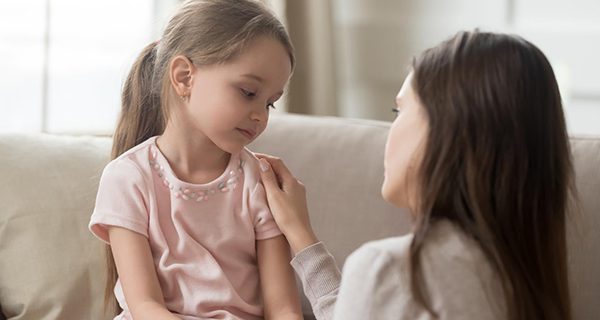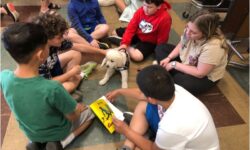Social distancing during the COVID-19 pandemic isn’t easy – but it can be especially difficult for children and teens who rely on structure and friends for a sense of normalcy and security.
Erin Kuehn is a licensed social worker and the Coordinator of Social and Emotional Learning for children in grades K through 8 in the Westwood Public Schools. She has advice for how to best talk to your kids about the coronavirus outbreak.
“First of all, it’s crucial that parents are taking care of themselves,” Kuehn said. “We have to make sure we’re managing our own fears, anxieties and stress levels. Do whatever you do to find a bit of inner peace, whether it’s exercising, journaling or meditating. If kids get the sense that it’s too overwhelming for their parents, they’re going to be less likely to go to them.”
Kuehn adds that it’s important to validate your children’s feelings in these troubling times instead of dismissing them. Even very young children likely understand something out of the ordinary is going on.
“Active listening is more important than ever,” Kuehn said. “Listen to what your children are saying and address those specific concerns. Perhaps they’re afraid that they might get sick, or that their grandparents could fall ill. Now is the time to really hear what they’re saying and answer their questions.”
Making false promises isn’t advisable. Instead, parents should be highlighting the things you’re doing as a family to keep each other safe.
“We want to validate their experience as they share their negative thoughts,” said Kuehn. “Kids are probably going to have a lot of negative thoughts. We should validate those feelings, while trying to focus on the positive.”
Older children bring a different set of fears and issues. Many of these fears center around missing friends and doubts that they will have a prom, a spring sports season or a graduation ceremony.
“When you think about adolescents and that time in our lives, you’ll remember caring about our social communities and our friends,” said Kuehn. “I do worry about that group in terms of anxiety and depression.”
Kuehn recommends parents create a sense of routine. It’s important your kids get up at a normal time of day. Taking part in family activities with your older children is just as important as playing with younger ones. And if your children already talk with a psychologist or social worker on a regular basis, that therapy should continue, even if it must be done remotely. Kuehn also says families who haven’t previously sought the help of a therapist should consider doing so if parents notice changes in sleeping, eating or motivation in their children.
Finding ways to stay connected and part of your community can be a way to help your kids feel they are doing something useful. Whether you offer to pick up groceries for an elderly neighbor or family member, virtually read to senior citizens at a nursing home or send cards to hospitalized children, Kuehn says these small measures can go a long way in making your kids feel connected to the world.
Watching the news with your kids is advisable for parents with older children. “I would advise parents with younger children in the household keep them away from the news,” Kuehn said. “Some of it can be overwhelming right now. With older children you can use the news as a catalyst for open dialogue, but limit how much news is on in your house.”
Until schools reopen, guidance counselors and school psychologists will be checking in regularly with students – particularly at the middle and high school levels. This may take place in the form of a phone call or email. Others will be offering Google Hangout “office hours” where students can “drop in” to talk.
“The good news is that our counselors know the students very well and know which kids need even more social connection,” said Kuehn. “Our staff is here and ready to help any student who needs to talk or vent during these unprecedented times.”






















